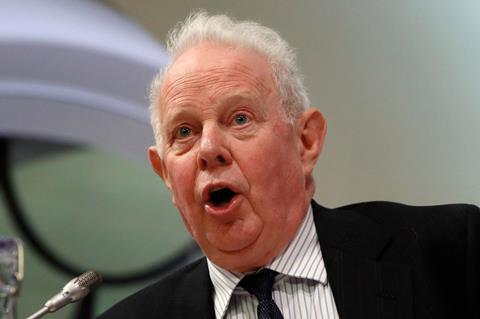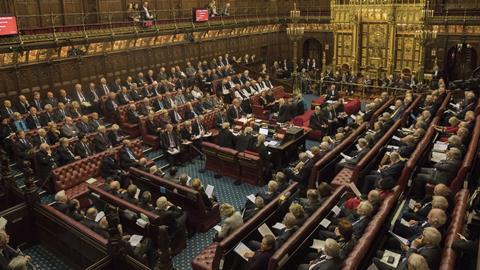Far from putting ‘remedial tools into the judicial toolbox’, the Judicial Review and Courts Bill is under attack from peers for ‘tilting the playing field’ against those seeking to hold public authorities to account
The Judicial Review and Courts Bill is something of a misnomer: just two of its 49 clauses, as currently drafted, are directed at reforming judicial review.
Unsurprisingly, however, those two controversial clauses loomed large on the first day of the House of Lords’ committee stage debate this week, with strong interventions from eminent jurists and former senior judges.
The government’s proposed reforms are twofold: first, they introduce ‘prospective-only’ and suspended quashing orders, ‘new remedies’ the courts can use when a public body’s decision is found to be unlawful.
They would also abolish the Cart jurisdiction, as recommended by the Independent Review of Administrative Law (IRAL), under which a party can bring a judicial review in the High Court when an application for permission to appeal has been refused by the Upper Tribunal.
Justice minister Lord Wolfson said the new remedies will ‘put another couple of remedial tools into the judicial toolbox’, while overturning the Supreme Court’s 2011 decision in Cart ‘supports the efficiency of our justice system’.
But the proposals face amendments from opposition parties, leading silks and judicial heavyweights – including former master of the rolls Lord Etherton, who warned that the presumption to deploy the new remedies is ‘potentially dangerous in practice’.
Much of the debate focused on this apparent presumption in favour of courts making prospective-only or suspended quashing orders rather than an ordinary quashing order.
Crossbencher and EU law silk Lord Anderson, who told peers he does not object in principle to the introduction of the new remedies, said the presumption looked like ‘an attempt to tilt the playing field against those who seek to hold public authorities to account for their unlawful actions’.
He proposed an amendment – supported by Etherton, public law silk Lord Pannick and Labour’s shadow justice minister Lord Ponsonby – to remove those parts of the bill ‘by which the government seek to enlist our aid in watering down the remedies judges might grant.
‘The judges can and should be trusted to serve the interests of justice without presumptions designed to serve the interest of their promoters,’ Anderson said.
Pannick concurred, saying it is ‘surely unnecessary and inappropriate for ministers to seek to tilt the balance by creating presumptions to try to influence the judges as to which tools from the toolbox… it is appropriate for them to pull out and use’.
Etherton said the presumption, which he noted was not based on the IRAL’s recommendations, is ‘unnecessary, it is wrong in principle and it is potentially dangerous in practice’.
Former Supreme Court justice Lord Hope also agreed, saying: ‘It really is ridiculous to overwork to this extent the amount of directions being given to the judge. It is not necessary, it is bad legislation and it is extremely dangerous.’
Hope suggested that ‘the government are trying to create something in their own interest’, while the former lord chief justice Lord Judge went further, asking peers: ‘Why are we giving a presumption which is in favour of the wrongdoer?’
However, IRAL chair Lord Faulks pushed back, saying the presumption was not ‘particularly harmful’ although he added that he was ‘not wholly convinced of its necessity’.
Wolfson described it as ‘a so-called, or low-level, presumption’ and said the bill simply asks the court to ‘specifically consider whether these remedies are appropriate and to use them… “unless it sees good reason not to do so”’.
The presumption is intended to ‘encourage judges to use the new remedies where appropriate’, Wolfson said, adding that ‘to characterise the presumption as an attempt by the executive to control the courts or remove their discretion is misleading’.

The Cart jurisdiction similarly faces cross-party opposition, with both Ponsonby and the Liberal Democrats’ justice spokesperson and commercial law silk Lord Marks supporting an amendment which would remove the abolition of Cart from the bill. Etherton, who said his own experience was that cases brought under the Cart jurisdiction are ‘almost invariably utterly hopeless’, has proposed ‘a middle course’: abolish Cart but ‘subject to limited exceptions’.
Lord Thomas of Cwmgiedd (pictured, inset) another former lord chief justice, commended Etherton’s ‘pragmatic solution’, but warned: ‘One thing we cannot do is to leave out of the equation the ability to have a review where there has been a fundamental error of law.’
However, Wolfson said Etherton’s proposal ‘would not meet the government’s policy intent’, emphasising that ‘there must be a limit’ on the right to apply for permission to appeal.
The battle lines have been drawn: it seems likely the government will get most of what it wants in the bill through parliament – but not without a long, hard slog.





































No comments yet